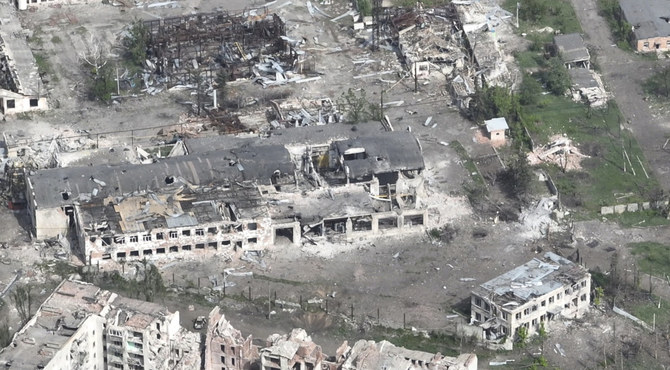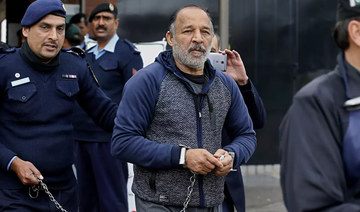LITTLE ROCK, Arkansas: An Arkansas man was accused Thursday of beating a police officer with a pole flying a US flag during last week’s riot at the US Capitol, according to court documents.
In an arrest affidavit filed Thursday in federal court in Washington, an FBI agent said Peter Francis Stager is shown in video and photographs striking a prone police officer repeatedly with the flagpole after rioters dragged the officer down the Capitol’s west stairs.
Confidential informants had recognized Stager in riot video and photographs and alerted authorities, who have charged Stager with interfering with law enforcement officers during a civil disorder, according to the affidavit.
Stager was in custody Thursday, said Allison Bragg, spokeswoman for the US Attorney’s Office in Little Rock, Arkansas. She referred all questions about the arrest to the US Attorney’s Office in Washington, where a spokesman did not immediately return a message Thursday.
No attorney was listed for Stager in court records.
Stager is the second Arkansas resident to be arrested and charged with participating in the Jan. 6 attack of the Capitol by pro-Trump loyalists that left five people dead, including a police officer. A detention hearing is scheduled for Friday in federal court in Little Rock for Richard Barnett, 60, of Gravette, Arkansas, who remains in federal custody after his arrest on charges that included unlawfully entry to a restricted area with a lethal weapon — in this case, a stun gun.
The FBI identified Barnett as a rioter photographed sitting in House Speaker Nancy Pelosi’s office chair during the Capitol insurrection. He surrendered to federal agents on Jan. 8.
'Rioter aimed to take hostages’
In Texas, a prosecutor said in a court that a retired Air Force officer who was part of the mob that stormed the US Capitol carried plastic zip-tie handcuffs because he intended “to take hostages.”
“He means to take hostages. He means to kidnap, restrain, perhaps try, perhaps execute members of the US government,” Assistant US Attorney Jay Weimer said of retired Lt. Col. Larry Rendall Brock Jr. without providing specifics.
The prosecutor had argued that Brock should be detained, but Magistrate Judge Jeffrey L. Cureton said he would release Brock to home confinement. Cureton ordered Brock to surrender any firearms and said he could have only limited Internet access as conditions of that release.
“I need to put you on a very short rope,” Cureton said. “These are strange times for our country and the concerns raised by the government do not fall on deaf ears.”
Brock appeared in court in a light green jumpsuit, a mask and with shackles at his hands and feet.
Weimer did not detail a specific plan by Brock but noted “his prior experience and training make him all the more dangerous.”
He also read in court social media posts from Brock, including one posted on the day of the Capitol riot that said: “Patriots on the Capitol. Patriots storming. Men with guns need to shoot their way in.”
Brock was arrested Sunday in Texas after being photographed on the Senate floor during the deadly riot wearing a helmet and heavy vest and carrying plastic zip-tie handcuffs. The 53-year-old is charged with knowingly entering or remaining in a restricted building or grounds without lawful authority, and violent entry and disorderly conduct on Capitol grounds.
Brock’s attorney, Brook Antonio II, noted that Brock has only been charged with misdemeanors. Antonio said there was no direct evidence of Brock breaking doors or windows to get into the Capitol, or doing anything violent once he was inside.
“It’s all talk. It’s all speculation and conjecture,” said Antonio, who noted Brock’s long service in the military, including being reactivated after Sept. 11 and his four tours in Afghanistan.
Weimer said Brock will likely face additional charges.
More than 100 charged
More than 100 people have been arrested in the Capitol riot, with charges ranging from curfew violations to serious federal felonies related to theft and weapons possession.
The FBI has been investigating whether some of the rioters had planned to kidnap members of Congress and hold them hostage.
Before his arrest, Brock told The New Yorker magazine that he found the zip-tie cuffs on the floor and that he had planned to give them to a police officer.
“I wish I had not picked those up,” he said.
There was no evidence presented that Brock had a firearm on the day of the Capitol riot.
Antonio asked an FBI agent who was testifying whether it was possible Brock had just picked up the cuffs, and the agent acknowledged that was a possibility.
Weimer read a termination letter from Brock’s former employer that said he had talked in the workplace about killing people of a “particular religion and or race.” Weimer also read social media posts in which Brock referred to a coming civil war and the election being stolen from President Donald Trump.
Weimer said Brock’s posts also referenced the far-right and anti-government Oath Keepers and the Three Percenters, a loose anti-government network that’s part of the militia movement. The Oath Keepers claim to count thousands of current and former law enforcement officials and military veterans as members.
The FBI agent though testified there was no evidence beyond the social media posts that Brock was involved with either of those groups.
Judges across the country, including some nominated by Trump, have repeatedly dismissed cases challenging the election results, and Attorney General William Barr has said there was no sign of widespread fraud.




























